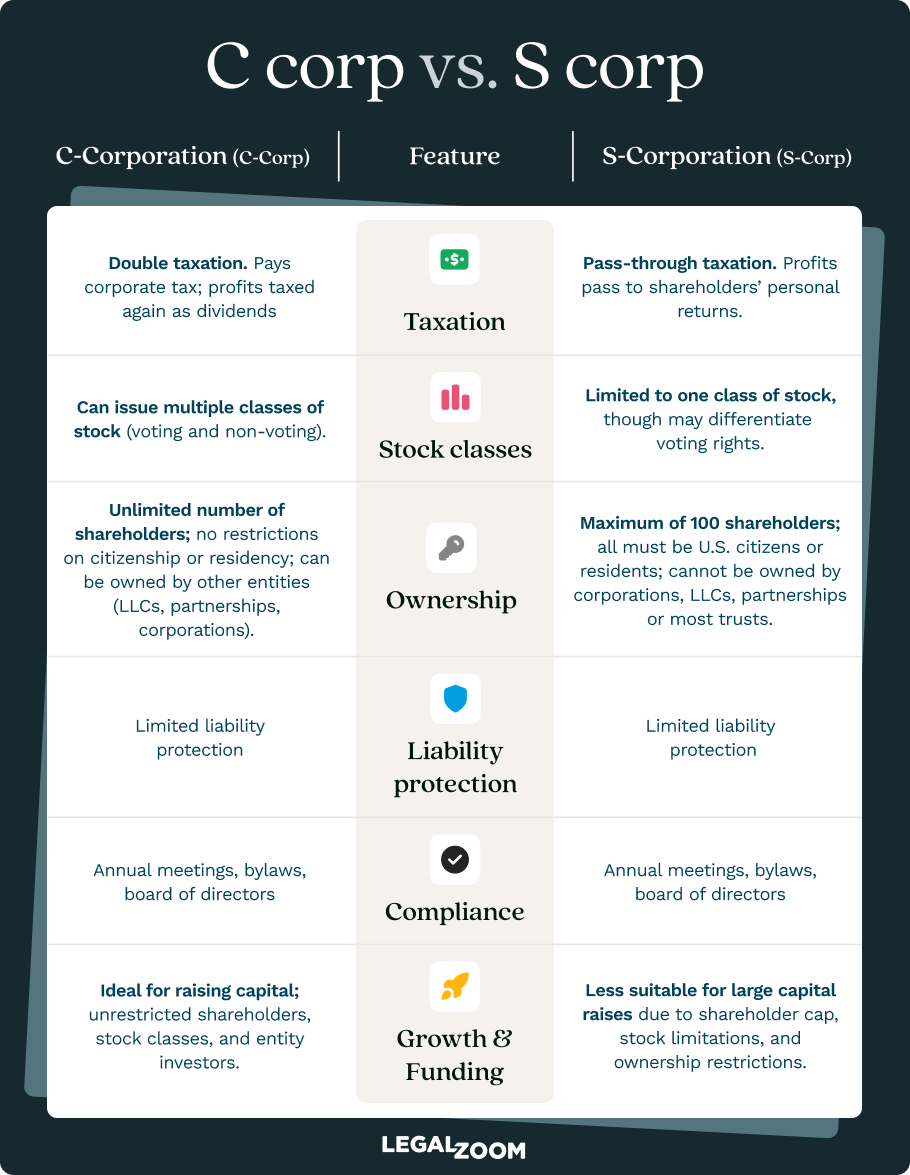A New Mexico corporation is a legal business entity that you can form with the NM Secretary of State (SoS). It exists separately from its owners (the shareholders) and offers unique advantages and disadvantages compared to other business structures.
Benefits of a New Mexico corporation
- Limited liability. Corporations generally shield each stockholder’s assets from company debts and liabilities.
- Credibility. Due to their stricter management requirements, investors, vendors, and clients tend to view corporations as more credible.
- Tax flexibility. Eligible New Mexico corporations have the option to elect S corp status for pass-through taxation or file as a corporation and benefit from corporate business deductions and potential self-employment savings.
- Perpetual existence. The corporation continues to exist even if ownership changes.
- Access to capital. Corporations have the ability to issue different classes of stock, which helps to attract investors.

Drawbacks of a New Mexico corporation
- Double taxation. Corporations can pay taxes on the same income twice, both at the corporate level and the individual (stockholder) level.
- Less flexibility. Business structures like LLCs and sole proprietorships have more control in terms of how they run their business.
- Complex. After incorporation, there are ongoing fees, filing, and record-keeping requirements.
How do I form a New Mexico corporation?
You form a New Mexico corporation by filing articles of incorporation with the Secretary of State. You can have us file for you or file yourself through these steps.
Once you’ve incorporated, there are a few more things you need to do to get your business operational and in compliance with state and federal laws.
Step 1: Confirm name availability
Before you file articles of incorporation, make sure your preferred business name is available. To do this, conduct a New Mexico business entity search. The SoS keeps online records of registered businesses on their website. You can review this list to see if a business exists under the name you had in mind.
If it’s available, make sure the name also meets New Mexico requirements:
- It must contain the words "corporation," "incorporated," "company," or "limited," or an abbreviation of one of those words (corp., inc., co., or ltd.).
- It can’t be the same as or confusingly similar to the name of any other business entity on file with the Secretary of State.
- It can’t contain any word or phrase that implies it’s organized for a purpose other than what’ stated in its articles of incorporation.
Note: If you’re not ready to file articles, you can file a name reservation application through the Secretary of State's business portal. The filing fee is $25, and it will hold the name for 120 days while you prepare.
Step 2: Appoint a New Mexico registered agent
Every New Mexico corporation must have a registered office and a registered agent who’s available at that office to receive lawsuits, notices, and demands on behalf of the corporation. According to New Mexico law, your registered agent must meet one of these requirements:
- Is an individual resident of New Mexico
- Is a domestic corporation with a physical place of business in New Mexico that is the same as the registered office
- Is a foreign corporation authorized to transact business in New Mexico having a place of business that is the same as the registered office
A corporation can’t serve as its own registered agent, but a director or officer of the corporation can. That said, many businesses choose to hire a professional agent for the security and flexibility. LegalZoom’s Albuquerque registered office meets all state requirements.
Step 3: Set up stock structure
New Mexico law requires you to specify basic information about your corporation's stock structure in the articles of incorporation. You’ll need to state at least the total number of shares that your corporation will have the authority to issue. If you plan to issue more than one class of shares, state the number of shares in each class and the preferences, limitations, and rights that come with each class, such as voting rights.
Keep in mind that the filing fee is based on an initial limit of 100,000 shares. That fee will increase by $1 for each 1,000 shares over that limit.
Step 4: Specify incorporators and initial directors
Your articles also need to appoint one or more incorporator(s) and include the names and addresses of the initial board of directors. The role of the incorporator is to form the corporation, while the role of the directors is to hold the first organizational meeting and govern the corporation until the stockholders elect a new board of directors.
Step 5: Prepare and file articles of incorporation
Your corporation’s existence begins when you file articles of incorporation with the Secretary of State. Here’s what you need to include:
- Name of the corporation
- Names and addresses of incorporators
- Names and addresses of initial directors
- Registered agent and registered office
- Period of duration, if not perpetual
- Corporate purpose
- Stock structure
- Registered agent statement of acceptance
As of January 2026, the New Mexico SoS only accepts online business filings. To file, make an account with their online business portal and select articles of incorporation from the “forms” tap. The minimum filing fee is $100 and the maximum filing fee is $1,000.
Step 6: Hold an organizational meeting and adopt bylaws
Once your corporation exists, the board of directors need to hold an organizational meeting to do the following:
- Adopt bylaws
- Appoint officers
- Transact other important business (such as elect to issue stock certificates and authorize corporate bank accounts)
A corporation’s bylaws describe its internal rules and operating procedures. Your bylaws can contain any provisions that address how to manage and regulate your corporation. But, those provisions can’t contradict your articles of incorporation or New Mexico law. These are some common provisions to consider:
- Number of directors and officers
- Duties and responsibilities of directors and officers
- Procedures for shareholder meetings
- Voting procedures and quorum requirements
- Stock transfer restrictions
- Amendment procedures
- Indemnification provisions
Step 7: Obtain state and federal tax IDs
The next step is to apply for an employer identification number (EIN). An EIN is a federal tax ID that your corporation needs to file federal taxes, open a business bank account, hire employees, and obtain certain licenses and permits.
You can apply for free online through the Internal Revenue Service (IRS) or have LegalZoom handle it for you.
Then, register with the Taxation and Revenue Department. You’ll receive a NM tax identification number and separate individual ID numbers for any of the following NM business taxes that apply to your business:
- Compensating tax
- Governmental gross receipts tax
- Gross receipts tax
- Interstate telecommunication gross receipts tax
- Leased vehicle gross receipts tax and surcharge
- Non-wage withholding tax
- Wage withholding tax
Step 8: Open a corporate bank account
This step is helpful to maintain your limited liability status and protect your personal assets. A separate business bank account will also help ensure your business keeps proper financial records.
Here’s what you’ll generally need:
- Certificate of incorporation
- EIN
- Corporate bylaws
- Board resolution authorizing account opening
- Identification for authorized signers
How are New Mexico corporations taxed?
New Mexico corporations need to meet both state and federal taxation requirements. It’s crucial to understand these tax obligations for both compliance and financial planning.
These are some common corporate taxes.
- Corporate income tax: 5.9%
- Franchise tax: $50 per year minimum for the privilege of doing business as a New Mexico corporation
- S corporation taxes: Range from 1.5% to 5.9% (pass-through taxes)
- Gross receipts tax: New Mexico's primary business tax, imposed on most business activities
- Local gross receipts tax: Additional gross receipts tax imposed by municipalities and counties
- Compensating tax: “Use tax” on items purchased outside New Mexico for use in the state
- Withholding tax: For employee wages withheld for federal tax purposes
These are just the most common, but certain professions or business activities will require you to sign up for additional taxes—a CPA or tax advisor can help you know for sure.
New Mexico compliance requirements
In addition to keeping up with taxes and business licenses, New Mexico corporations need to file a biennial report to maintain compliance with the state. The purpose of the report is to update the SoS on your business’ basic information. This includes your registered agent’s name and office address, director and officer information, and the date of your next annual shareholders’ meeting.
It's due every two years by the 15th day of the fourth month following the end of your corporation’s taxable year. For calendar year corporations, that’s April 15. Submit your report online through the SoS’ online business portal along with the $25 (plus $1.95 if paying by debit or credit card) filing fee.
Here’s how to file:
- Navigate to the business portal and sign into your account
- Click the “corporations” tab and select “biennial report”
- Find your business name from the search results
- Fill out the report and pay the filing fee
- Check that you’ve received filing confirmation
Start your New Mexico corporation with LegalZoom
There's a reason more than four million businesses have chosen LegalZoom to help them get off the ground. Our incorporation service can take care of everything you need to form your New Mexico corporation.
Here are some of the perks:
- Streamlined process. LegalZoom combines technology and experience to take the guesswork (and paperwork) out of business formation. Our online process can help you start your corporation in minutes.
- Expert support. All of our corporation formation packages include a meeting with a small business specialist and a consultation from 1-800Accountant.
- A full suite of services. Beyond just incorporation services, LegalZoom supports all your business filing needs. We provide year-round compliance management, bookkeeping tools, access to business attorneys, registered agent services, and trademark registration.
FAQs about New Mexico corporations
How do I open a corporation in New Mexico?
To form a corporation in New Mexico, you need to prepare and file articles of incorporation with the Secretary of State, pay the $100 (minimum) filing fee, and adopt corporate bylaws and issue stock certificates. There are also certain taxes and business licenses that your corporation may need to sign up for to operate in compliance with federal, state, and local laws.
How are New Mexico corporations taxed?
New Mexico corporations can file and pay taxes as either a C corp or an S corp depending on the corporation’s size and preference. General (C) corporations pay a 5.9% corporate income tax on net income, plus a minimum $50 annual franchise tax. They must also register for and pay gross receipts tax on business activities. S corporations generally pass income through to shareholders’ individual tax returns.
Do New Mexico corporations file annual or biennial reports?
New Mexico for-profit corporations file biennial (every two years) reports. The reports are due by the 15th day of the fourth month following the end of your corporation’s taxable year.
How do I look up a corporation in New Mexico?
Use the business search page on the Secretary of State's online business portal. You can search by entity name, number, registered agent, or officer/director name to find information about any New Mexico corporation.
Is a New Mexico corporation better than an LLC?
That depends on your specific needs. Corporations offer limited liability, potential tax benefits, and easier access to investment capital, but require more formalities and paperwork. LLCs offer similar liability protection with more operational flexibility but may have ownership and investment limitations.
Do I need a New Mexico registered agent?
Yes, all New Mexico corporations must have a registered agent with a street address in New Mexico. The registered agent’s role is to receive legal documents and official correspondence on behalf of the corporation. Then, promptly forward those documents to the business.
How do I register a foreign corporation?
Foreign corporations (businesses formed in other states) must apply for a certificate of authority with the New Mexico Secretary of State. To do this, they’ll need a New Mexico registered agent and a certificate of good standing from their home state.
Jane Haskins, Esq., contributed to this article.



